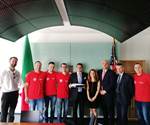2018 American Solar Challenge is underway
Participating vehicles are typically constructed of a carbon fiber monocoque chassis and powered by solar arrays and lithium ion batteries.
The 2018 American Solar Challenge, a biennial solar car tour across the US, is underway this week. Participating vehicles are typically constructed of a carbon fiber monocoque chassis and powered by solar arrays and litium ion batteries.
As of Thursday, July 19, the challenge had concluded its third stage with Western Sydney University (Sydney, Australia) having won Stages 1 and 3 in the single occupant vehicle (SOV) class, and the defending champion University of Michigan (Ann Arbor, MI, US) at their heels having won Stage 2 and coming in second place for the other two stages.
University of Minnesota (Minneapolis, MN, US) is leading the way in the multi occupant vehicle (MOV) class, having won all three stages thus far. University of Bologna (Bologna, Italy) is second place in the MOV class.
More information about the competition including team profiles and results can be found at americansolarchallenge.org.
Related Content
-
MingYang reveals 18-MW offshore wind turbine model with 140-meter-long blades
The Chinese wind turbine manufacturer surpasses its 16-MW platform, optimizes wind farm construction costs for 1-GW wind farms.
-
Recycling end-of-life composite parts: New methods, markets
From infrastructure solutions to consumer products, Polish recycler Anmet and Netherlands-based researchers are developing new methods for repurposing wind turbine blades and other composite parts.
-
Novel composite technology replaces welded joints in tubular structures
The Tree Composites TC-joint replaces traditional welding in jacket foundations for offshore wind turbine generator applications, advancing the world’s quest for fast, sustainable energy deployment.











.jpg;maxWidth=300;quality=90)
